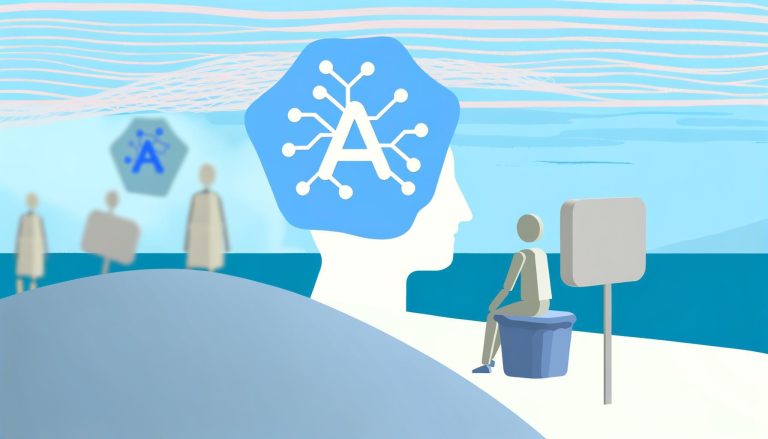Artificial Intelligence (AI) has increasingly become an essential tool in the field of mental health, providing new ways to understand and treat various mental disorders. One such condition that has seen potential benefits from AI is depersonalization-derealization disorder (DDD). This article explores how AI technologies contribute to understanding and managing DDD, offering valuable insights into treatments and management strategies.
Introduction
Depersonalization-Derealization Disorder (DDD) is a complex mental health condition characterized by persistent feelings of detachment from one’s self (depersonalization) or sense of unreality about the surroundings (derealization). These symptoms can significantly impair an individual’s quality of life. Traditional treatments include psychotherapy and medications, but AI brings new, promising opportunities to enhance understanding and care for those affected by DDD.
Understanding Depersonalization-Derealization Disorder
To fully grasp how AI can aid in understanding and treating DDD, it’s crucial to first comprehend the disorder itself.
Symptoms of DDD
- Feeling disconnected from one’s body or mind
- Sensing that surroundings are unreal or distorted
- Emotional numbing
- Difficulties with remembering or recalling events
- Anxiety and depression accompanying these sensations
Causes and Risk Factors
While the exact causes are not entirely understood, several factors are believed to contribute to DDD, including:
- Severe stress or trauma
- Childhood abuse or neglect
- Substance abuse
- Family history of mental health disorders
How AI Helps in Understanding and Treating DDD
The application of AI in mental health is multifaceted, ranging from early diagnosis to personalized treatment plans. Here’s how AI specifically contributes to DDD.
Early Diagnosis and Detection
Early intervention is key to managing DDD effectively. AI-powered tools and algorithms can analyze vast amounts of data to detect early signs of DDD that might be missed in traditional clinical settings. These technologies can monitor speech patterns, facial expressions, and even physiological markers to identify symptoms of depersonalization and derealization.
- Machine Learning Algorithms: By processing patient data, machine learning models can predict the likelihood of a person developing DDD.
- Natural Language Processing (NLP): NLP technology can analyze spoken or written language to detect verbal cues indicative of DDD.
Personalized Treatment Plans
AI can help tailor treatment strategies to individual needs. This personalized approach can result in more effective management of DDD symptoms.
- Customized Therapy: AI algorithms can analyze patient responses to various therapeutic methods and recommend the most effective ones.
- Medication Management: AI can assist in determining the best medication combinations and dosages based on patient history and genetic factors.
Virtual Reality (VR) Therapy
VR therapy is an emerging treatment modality enhanced by AI technologies. For individuals with DDD, VR can provide controlled environments to help ground them in reality, offering a unique way to manage and potentially reduce symptoms.
- Immersive Experiences: AI-driven VR systems can create realistic scenarios that help patients re-engage with their sense of self and surroundings.
- Monitoring Progress: AI algorithms can track how patients respond to VR therapy, adjusting scenarios in real-time for optimal therapeutic benefit.
Continuous Monitoring and Support
AI-powered applications and wearable devices enable continuous monitoring of patients outside clinical settings. This ongoing observation can provide valuable insights into their daily experiences and symptom fluctuations, thus guiding treatment adjustments as needed.
- Mobile Apps: AI-driven apps can track moods, habits, and other indicators of mental health, providing real-time feedback and support.
- Wearable Technology: Devices with AI capabilities can monitor physiological markers (e.g., heart rate, skin conductance) to detect stress or depersonalization episodes.
Data-Driven Insights for Research
AI’s ability to process and analyze large datasets can accelerate research into DDD, potentially uncovering new insights into its causes, progression, and treatment responses.
- Pattern Recognition: AI can identify patterns in patient data that might hint at underlying mechanisms of DDD.
- Collaborative Research: AI facilitates data sharing and analysis across different research institutions, speeding up the discovery process.
Benefits and Practical Tips
Integrating AI into the understanding and treatment of DDD offers numerous benefits, but there are also practical considerations to keep in mind.
Benefits of AI in DDD Treatment
- Enhanced Accuracy: AI’s precision in diagnosing and monitoring can lead to better treatment outcomes.
- Personalized Care: Customized treatment plans ensure that individual patient needs are met effectively.
- Accessibility: AI-powered tools can reach more people, including those in remote or underserved areas, providing greater access to care.
Practical Tips for Using AI Tools
- Consult Healthcare Professionals: Always use AI tools alongside advice from healthcare providers to ensure comprehensive care.
- Monitor Usage: Regularly review how AI applications perform and be open to adjustments based on effectiveness.
- Stay Informed: Keep up with the latest developments in AI technologies related to mental health for potential new tools and methods.
Conclusion
AI offers promising advancements in understanding and treating depersonalization-derealization disorder. From early diagnosis to personalized treatment plans and continuous monitoring, AI technologies are paving the way for more effective management of DDD. By embracing these innovations, people affected by DDD can find new hope and practical solutions to navigate their condition more effectively.
For those interested in tracking their mental health and seeking personalized support, the Zenora App offers features like mood and habit tracking through journal entries, along with goal-setting tools that can complement traditional therapies and AI-driven insights. Embrace these technologies for a holistic approach to mental well-being.





